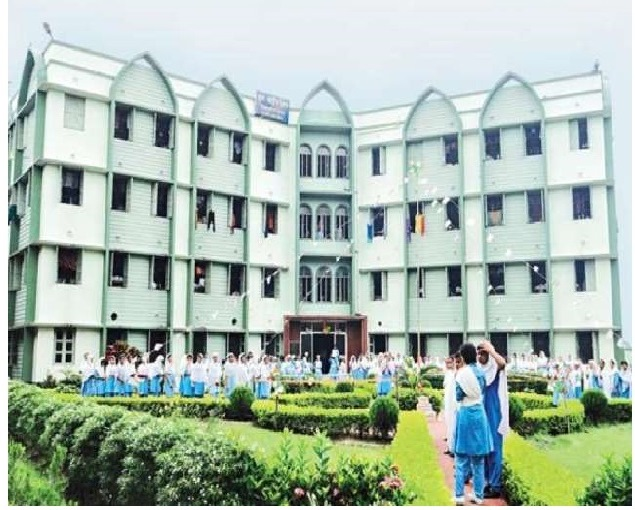

By Qalamdar
A soft-spoken, unassuming man with a glowing face who radiates love, peace and kindness: that’s one way to describe 61 year-old Mohammad Nurul Islam Middya.
Nurul Islam is one of the pioneers of an educational renaissance among the Muslims of West Bengal. He was born in 1959 in Khalatpur, in what was then a remote village in West Bengal’s Howrah district, located some 60 kilometres from Kolkata. He studied in the local village school. In 1976, when he was in the 10th standard, a man in the village set up a madrasa and selected young Nurul Islam as its secretary. That was the beginning of his future mission of educational reform.
Nurul Islam was pained by the general educational marginalisation of the Muslims of West Bengal. Following the Partition in 1947, many economically well-off families from this part of Bengal shifted to what is now Bangladesh. The bulk of the Muslims who remained in West Bengal were socially, economically and educationally marginalised. Although they accounted for more than a fourth of the state’s population, their representation in sectors like government service and business was very low. Nurul Islam believed that education was the key to the development of the community.
As a student at the Maulana Azad College in Kolkata, Nurul Islam’s interest in working for the educational progress of the marginalised Muslims of West Bengal received a further impetus when he came in touch with a professor of the college from whom he came to know about Sri Ramakrishna and the Ramakrishna Mission, whose institute of culture he used to frequent. He was impressed by the selfless service of monks of the Ramakrishna Mission. He appreciated their social engagement, including their work in the educational field, combining secular education with spiritual and value-based education. He developed the idea of a similar sort of mission among the Muslims of West Bengal. And so, in the mid-1980s was born the Al-Ameen Mission. ‘Al-Ameen’ means ‘The Trustworthy’, a term by which the people of Mecca used to refer the Prophet Muhammad even before he received the first revelation.
Starting with a single school (located in the village of Khalatpur) with only seven students, the Al-Ameen Mission gradually turned into a veritable social movement. It now has some 70 schools, located in almost every district of West Bengal and some in nearby states such as Jharkhand, Bihar and Tripura. All of the institutes are residential. They aim at providing modern education with moral values in a fully residential system where students from various strata of society stay and learn together. In addition to the residential schools there are more than 25 day-schools. Almost all the schools run by the Al-Ameen Group have Bengali as the medium of instruction and follow the West Bengal state curriculum, although there is a move towards adopting English as the medium in some of the schools
Setting up these schools is not an end in itself, Nurul Islam explains. Rather, they are intended to help students join the educational ‘mainstream’. And his vision for the schools is not simply to help children get ‘good’ scores and land up with a ‘good’ job. ‘Man is the most eminent among all of God’s creatures,’ he explains, adding, ‘Through proper education, children’s talents should be nurtured so that they become better human beings”good people, who serve others and lead a peaceful life and help spread peace in the country and in the world.’
So far, almost 23,000 students have passed out from the Al-Ameen Mission’s residential institutes. At present, the total student strength is around 17,000. Many students come from economically vulnerable Muslim families. A substantial number of seats are reserved for orphans and meritorious students of very poor families. The fee structure is calibrated according to the financial capacity of the students’ families. Presently, some 25% of the students pay fees ranging from 0 to 25% and so enjoy 75 to 100% subsidy, which is met from zakat funds. Some 40% of the students pay fees ranging from 26 to 60% of the total fees and receive between 40 to 74% subsidy, which is met from public donations.
The dedicated efforts of Nurul Islam and his team have had a remarkable impact on the overall conditions of the Muslims of West Bengal. Over the years, numerous Al-Ameen students have excelled in academics and have gone on to take up a range of careers in India and abroad. If today Muslims in West Bengal have a considerably better representation in government services and many professions than some decades ago, much of the credit for that goes to Al-Ameen Mission, whose schools have produced a large number of doctors, engineers, government officials and other such professionals. Many of the alumni maintain a close relation with their alma mater, supporting it financially in order to help it carry on with its mission.
From its humble beginnings with one little school several decades ago, the Al-Ameen Mission has come a long way. It must not have been all smooth sailing though. What about the hurdles that it must have had to contend with? ‘Facing obstacles is a blessing (rehmat) from God,’ Nurul Islam explains. ‘Success lies within a problem. It is won by passing through obstacles’, he adds.
Nurul Islam’s efforts over the decades have won for him numerous awards and widespread recognition. His inspiring story is a powerful reminder of how just one well-intentioned person can make a major difference in the lives of literally tens of thousands of people!
(For more information about the Al-Ameen Mission, please see their website www.alameenmission.org)

COMMENTS